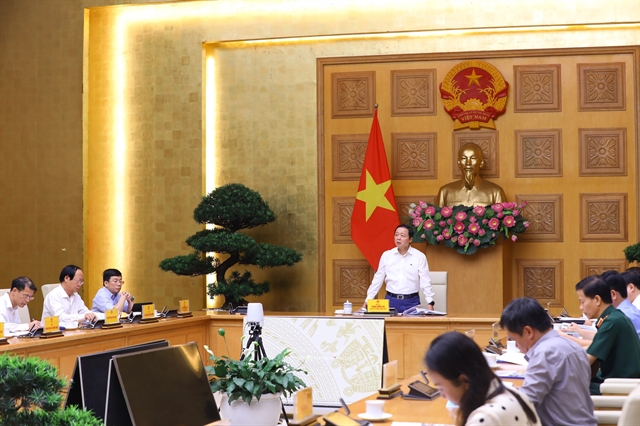 Politics & Law
Politics & Law

 |
| An overview of the meeting. — VNA/VNS Photo Văn Điệp |
HÀ NỘI — Deputy Prime Minister Trần Hồng Hà on Wednesday asked concerned agencies to focus on summarising 10 years of implementing Resolution 24-NQ/TW.
The Deputy PM stated that Resolution 24-NQ/TW identified many viewpoints, goals and tasks for proactively responding to climate change and promoting natural resources and environmental protection.
Therefore, the steering committee for summarising the resolution’s work results must evaluate all activities, actual results achieved and still unfulfilled goals.
The committee’s members should clearly analyse the causes and lessons learnt, with recommendations from management agencies at all levels, experts, scientists, localities, businesses and socio-political organisations.
"The summary of the implementation of Resolution 24-NQ/TW will be closely linked with resolutions, strategies and plans in related fields such as Resolution 36-NQ/TW on development strategies for Việt Nam's marine economy to 2030, with a vision to 2045, the green growth strategy and the national strategy on climate change,” he said.
Additionally, the domestic and international contexts have brought to light a number of new issues on climate change, resource management and environmental protection such as the goal of net zero greenhouse gas emissions by 2050, digital transformation, green transformation and the knowledge economy.
Presenting a report at the meeting, Deputy Minister of Natural Resources and Environment Võ Tuấn Nhân stated that after 10 years of implementing Resolution 24-NQ/TW, economic growth has begun to shift toward a greener direction.
The integration of climate change response and environmental protection into development strategies and plans continues to be emphasised.
Policies and laws on environmental pollution prevention and control have been increasingly refined, focusing on proactive control of pollution risk sources.
Forest protection and development have yielded many positive results, and the number of nature reserves has increased.
The capacity to forecast and warn of natural disasters has reached a top level in the region and is steadily approaching that of advanced countries in Asia.
Việt Nam has actively collaborated with the international community in reducing net greenhouse gas emissions and ensuring equitable energy transition, Nhân added.
Basic research, potential assessment, natural resources management, and exploitation have achieved numerous significant, sustainable, and more effective results.
Renewable energy sources have seen rapid development.
Notably, several goals set for 2020 were surpassed, including enhancing the capacity for natural disaster forecasting and warning, reducing harm to people and property from natural disasters, and cutting greenhouse gas emissions per unit of gross domestic product (GDP) by 8-10 per cent compared to 2010.
Other notable achievements include ensuring a balanced land fund for socio-economic development, maintaining and flexibly using 3.8 million hectares of rice-growing land for food security, and enhancing land use efficiency.
Furthermore, concerned agencies have reduced raw mineral exports, destroyed and treated over 85 per cent of hazardous waste, and effectively managed environmental pollution resulting from war consequences.
However, Nhân noted that the capacity to prevent natural disasters and adapt to climate change had not met expectations.
Greenhouse gas emission reductions remain limited.
Environmental pollution persists in numerous areas, particularly in industrial zones, river basins, and craft villages.
Marine pollution, stemming from aquaculture and plastic waste, is prevalent in many regions.
Issues such as flooding, saltwater intrusion, riverbank, and coastal erosion are widespread, with the Cửu Long (Mekong) Delta being especially affected.
Basic survey data and resource use planning exhibit numerous flaws and limitations.
Members of the steering committee opined that addressing climate change, enhancing resource management, and bolstering environmental protection are intricate and multifaceted challenges.
As such, the review must lucidly delineate goals, viewpoints, and long-term strategic visions, coupling them with feasible mid-term, immediate, and pressing solutions.
This endeavour should also be intertwined with rallying resources and the commitment of the entire political framework, from central to local tiers, as well as the international community.
Deputy PM Hà underscored that the Party's theoretical and ideological perspectives on climate change, natural resources, and environmental protection have been refined.
Hence, the summary of Resolution 24-NQ/TW ought to be anchored in the political, scientific, and practical principles of promoting a circular and green economy, as articulated in the 13th National Party Congress’ Resolution.
The summary should be intricately linked with the three pillars of sustainable development: economy, society, and environment.
Deputy PM Hà urged the Ministry of Natural Resources and Environment to focus intensively and bolster its team to finalise the 10-year review, ensuring its utmost quality.
Emphasis should be placed on juxtaposition with international indices and rankings, and on quantifying objectives and assignments with precise metrics.
The summary must clarify the rapid changes in the domestic and international context compared to the issuance time of Resolution 24-NQ/TW, with new issues and trends such as green, digital and economic transformation.
At the meeting, members of the steering committee also proposed plans and recommendations after completing the resolution’s implementation summary. — VNS




